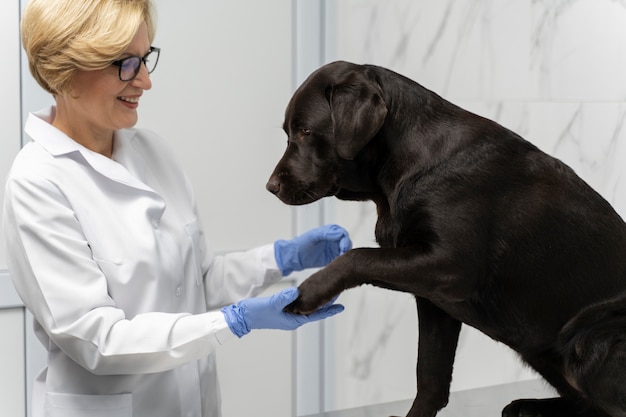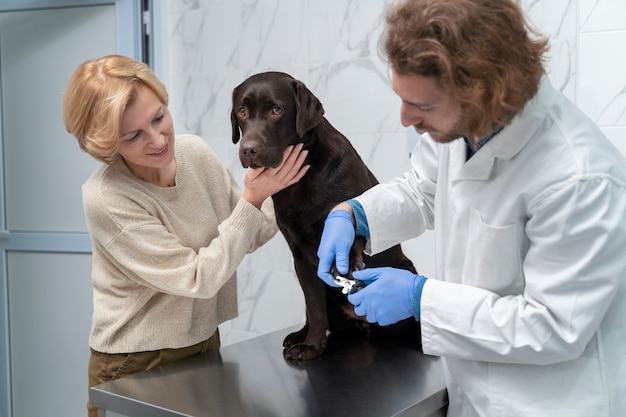Biopsy and Cytology for Pet Cancer Diagnosis Explained


Biopsy and Cytology for Pet Cancer Diagnosis Explained
When you hear the words “possible cancer” during a veterinary visit, your heart might skip a beat. For pet owners in Coral Springs and surrounding communities, understanding how veterinarians confirm cancer in dogs and cats is crucial for peace of mind and timely treatment. At Veterinary Cancer Health, located at 4101 Turtle Creek Drive, Coral Springs, FL 33067, our specialty oncology team uses advanced techniques like biopsy and cytology to provide accurate answers.
This blog will guide you through what biopsy for pet cancer and cytology in veterinary oncology really mean, why these procedures are so important, and what to expect if your pet needs them. We will also discuss the signs that might prompt these tests, the cutting-edge technology available at our clinic, and how to find a trusted oncology vet near me for your pet’s care. If you have questions about the process, our veterinary professionals are here to support you every step of the way. For a deeper dive into our biopsy and cytology procedures, you can visit our Biopsy & Cytology service page.
Recognizing When Biopsy or Cytology is Needed for Your Pet
Noticing new lumps, bumps, or unusual symptoms on your dog or cat can be unsettling. While not every mass is cancerous, veterinarians often recommend further investigation when certain warning signs appear. Key symptoms that may warrant a biopsy for pet cancer include the sudden appearance of a lump that grows rapidly, sores that do not heal, swelling in any part of the body, unexplained weight loss, a persistent loss of appetite, or ongoing lethargy. Additionally, if your pet’s lymph nodes feel enlarged, or if there is unexplained bleeding or discharge, these are signs that should never be ignored.
Owners in Coral Springs and nearby areas who spot these changes should reach out to an oncology veterinarian near me as soon as possible. Early detection and diagnosis are crucial for the best possible treatment outcomes. Even if your primary veterinarian has already performed an initial check, a specialist’s evaluation can provide advanced insights and next steps.
Understanding the Role of Biopsy and Cytology in Veterinary Oncology
You may wonder why a biopsy for pet cancer or cytology in veterinary oncology is recommended instead of simply treating a suspicious lump right away. The answer lies in the need for precision. Both biopsy and cytology are diagnostic tools, but each provides unique information to help guide your pet’s care.
Cytology involves collecting a small sample of cells from a mass or organ, usually with a thin needle. This is called fine needle aspiration. The cells are then examined under a microscope by a veterinary pathologist, who looks for signs of abnormality or malignancy. This method is minimally invasive and offers quick results, making it an excellent first step when a mass is found.
A biopsy, on the other hand, involves removing a larger tissue sample, sometimes the entire mass, for detailed examination. This can be performed using various techniques, such as a needle core biopsy, punch biopsy, or surgical excision. The tissue is analyzed to determine the type of cancer, its aggressiveness, and whether it has invaded surrounding structures. These details are essential for developing a customized treatment plan.
At Veterinary Cancer Health, our team leverages state-of-the-art diagnostic tools to ensure that both cytology and biopsy specimens yield the most accurate results possible. Our advanced cancer diagnostics, including advanced cancer diagnostic techniques, help us provide pet diagnostics in Coral Springs that rival those found at leading human cancer centers.
When Is Each Test Recommended?
The decision to use cytology versus biopsy depends on several factors. Cytology is often the first step if a mass is easily accessible, as it can quickly indicate whether a lump is benign or malignant. If the results are inconclusive, or if a more detailed analysis is necessary to identify the cancer type and grade, a biopsy is performed. Veterinary oncologists may also recommend a biopsy if surgery is already planned or if the treatment plan hinges on knowing the precise cancer subtype.
What Causes Veterinarians to Suspect Cancer?
Understanding why a veterinarian recommends a biopsy for pet cancer starts with knowing how cancer develops and presents in pets. Cancer occurs when abnormal cells grow uncontrollably, forming tumors or spreading throughout the body. Some cancers can be triggered by genetic predispositions, age, environmental factors, or previous exposure to certain viruses or chemicals. In South Florida, where pets spend ample time outdoors, environmental influences and sun exposure can sometimes play a role in tumor development, particularly in light-skinned cats and dogs.
Veterinary professionals remain vigilant for signs of cancer in pets, especially as they age or if they belong to breeds known to be at higher risk. Ongoing advances in veterinary oncology have made it possible to detect cancer at earlier stages, improving the chances of successful treatment. When a mass or suspicious symptom is found, the most reliable way to confirm if it’s cancer is through cytology or biopsy, paired with additional diagnostic tests as needed.
What to Expect: The Biopsy and Cytology Process at a Specialty Oncology Clinic
If your veterinarian has referred you to Veterinary Cancer Health for further testing, you can expect a thorough, compassionate approach every step of the way. Our oncology team will first review your pet’s medical history and perform a detailed physical exam. Based on preliminary findings, we may recommend cytology as a minimally invasive initial test. This typically involves using a thin needle to collect cells with minimal discomfort for your pet, and in many cases, sedation is not required.
If a biopsy is needed, our team will explain the procedure and the reasons behind it. Biopsies may be performed with local anesthesia, sedation, or general anesthesia, depending on the size and location of the mass. Safety, comfort, and accuracy are always our top priorities. Once the sample is collected, it is sent to a specialized pathology laboratory for analysis. Our cancer diagnosis and staging services ensure that every detail is considered when interpreting results, from cancer type and grade to the exact boundaries of the tumor.
Advanced Diagnostics: Beyond the Basics
In some cases, additional advanced diagnostics may be recommended alongside biopsy or cytology. Techniques such as DNA sequencing and molecular analysis can uncover genetic mutations driving your pet’s cancer, while CT scans or digital X-rays help map the tumor’s location and potential spread. These specialized tests are particularly valuable for pets with complex or rare cancers, allowing for more precise and effective treatment planning. If you are searching for pet diagnostics near me that offer this level of comprehensive evaluation, our clinic is equipped to deliver the most advanced options available.
Treatment and Ongoing Care Following Biopsy or Cytology
Once a diagnosis is made through biopsy for pet cancer or cytology in veterinary oncology, our veterinary professionals develop a personalized treatment plan tailored to your pet’s unique needs. Options may include medical treatments such as chemotherapy, targeted therapy, immunotherapy, or in some cases, electrochemotherapy. Each treatment approach is carefully selected based on the cancer type, stage, and your pet’s overall health.
Ongoing cancer care at our clinic involves regular monitoring, recheck exams, and bloodwork to assess how your pet is responding to treatment. Adjustments to the plan are made as needed to maximize effectiveness and minimize side effects. Our veterinary oncology team works hand-in-hand with your primary care veterinarian to ensure seamless communication and the best possible support for your pet.
If your pet is facing advanced cancer or experiencing discomfort, we also offer compassionate palliative care and pain management. Our goal is always to prioritize quality of life, whether we are pursuing aggressive treatment or providing comfort-focused care. For families seeking oncology vet near me services, our clinic stands ready to guide you through every decision with empathy and expertise.
What Pet Owners Can Do: Prevention and Home Care
While not all cancers can be prevented, pet owners can take proactive steps to support their dog or cat’s health. Regular wellness examinations allow early detection of new lumps or changes, increasing the likelihood of successful treatment if cancer does develop. Keeping your pet at a healthy weight, providing a balanced diet, and minimizing exposure to known carcinogens are all important preventative measures.
If you discover a lump or concerning symptom, avoid attempting to diagnose or treat it at home. Do not try to lance, squeeze, or remove any mass yourself, as this can worsen the situation or cause unnecessary pain. Instead, contact a veterinary oncology specialist for guidance. For those searching for veterinary diagnostics in Coral Springs or oncology vet near me options, timely intervention is critical for the best possible outcomes.
When to Seek Veterinary Care and Why Specialty Expertise Matters
It is vital to seek veterinary care promptly if you notice any of the symptoms discussed earlier, such as rapidly growing lumps, non-healing sores, unexplained weight loss, or persistent abnormal behavior. If your primary veterinarian suspects cancer or recommends further testing, a referral to a specialty oncology clinic like Veterinary Cancer Health can provide access to the most advanced diagnostic and therapeutic options available.
Specialist vet near me searches often lead pet owners to clinics with the tools and expertise required to handle complex cases. Our veterinary oncology team collaborates closely with referring veterinarians to ensure continuity of care and the most comprehensive support for your pet. In situations where a diagnosis is uncertain or prior test results are inconclusive, seeking a second opinion from an oncology vet near me can offer valuable clarity and peace of mind.
Compassionate Cancer Diagnostics for Your Pet: Take the Next Step
Navigating the possibility of cancer in your beloved pet can feel overwhelming, but you do not have to face it alone. The veterinary professionals at Veterinary Cancer Health are dedicated to providing advanced, compassionate cancer diagnostics and care for pets in Coral Springs and surrounding communities. If you have noticed a concerning mass, unexplained symptoms, or have been referred for a biopsy for pet cancer, our team is here to guide you with expertise and understanding.
To schedule a consultation or learn more about our cancer diagnosis services, call (195) 459-28504 or visit our Biopsy & Cytology page for a detailed overview of what to expect. Whether you are searching for an oncology veterinarian near me or seeking pet diagnostics in Coral Springs, our clinic at 4101 Turtle Creek Drive, Coral Springs, FL 33067 is committed to supporting you and your pet every step of the way. Let us help you find answers and provide the care your pet deserves. For more resources on cancer in pets, you may also want to review information from the American College of Veterinary Internal Medicine or Veterinary Cancer Society.
If you need an oncology vet near me or have questions about biopsy and cytology in veterinary oncology, our doors are open, and our hearts are with you and your pet.

.png)
















